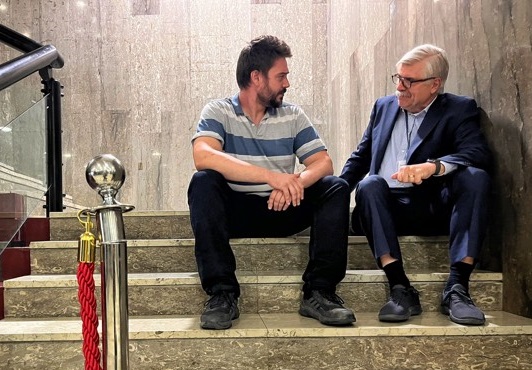
I approached him with great reverence. We never met before. In my 34 years, our lives had never intersected, yet when he saw me and we shook hands, his eyes welled up.
John Daniszewski now holds a high position as Vice President and Editor-at-Large for Standards at the Associated Press. He spent two decades as a correspondent for AP and the Los Angeles Times, covering wars and conflicts in the Middle East, Africa, and the Balkans.
I am a journalist in Sarajevo, inexperienced and without notable achievements— a freshman in this field.
Daniszewski was a speaker at a panel during the World Congress and Media Innovation Festival organized by the International Press Institute (IPI) in Sarajevo in May.
My “pigin” and I
Back in 1992, he met my mother, Aida, in Sarajevo. She was 30 at the time and occasionally worked for foreign journalists. She boasted to him about her ingenuity in caring for her two-and-a-half-year-old son, who always carried a backpack shaped like a penguin, which he called “pigin.”
In this “pigin,” she had packed a photo of my parents, my birth certificate, some clothes, diapers, biscuits, juice, 300 German marks, and a letter. The letter was addressed to whoever might find me as the sole survivor if a bomb hit our home and left me alone in the ruins. She asked the finder to contact my aunt in Germany and hand me over to the “Children's Embassy” to be evacuated to her. The 300 marks were for this service. The rest of the content was for me. To know who I am.
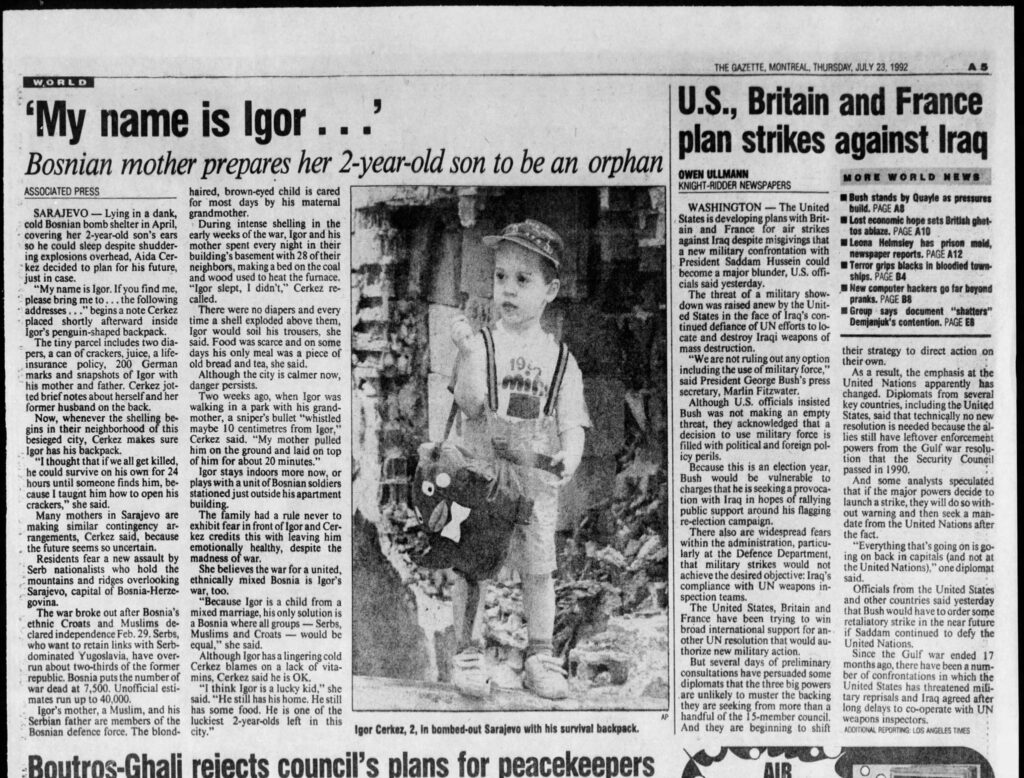
“Somehow, she told that story to me and I thought, I have to write this. It really was a story that brought home to me what war actually meant to a mother and to a family and the unpredictability of war here,” he recounted.
He said he was moved by the foresight and composure of a Sarajevo mother as she calmly and realistically talked about the precautions she had taken.
“And still, whenever I think about it, I still get a little teary-eyed”, he said.
“Yes, it's true. You don't know from moment to moment, day to day, if you'll survive and she was thinking about you and her love for you… I'm going to start crying again”, he added.
In the article he wrote back then, he mentioned that I was often sick due to the war conditions and that a sniper's bullet had whizzed “perhaps 10 centimetres” from my head a few days earlier while I was in the park with my grandmother.
It’s hard for me to comprehend this is about me. Honestly, I have no memory of being in such danger. People told me about it, but I never took it too seriously.
I only remember Germany. My grandmother and I went there in November 1992. My mother thought the war would end quickly, so we stayed with my aunt for the winter.
I returned in 1996.
I was six years old when I returned to a city filled with children who, it seemed to me, had far more life experience than I did. They had been here during the war. Growing up in my street among them, I often felt somewhat inferior and even felt a kind of guilt that they had lived through it while I had not. I tried not to be a “foreigner.”
So, when I found an article about myself in Sarajevo, it somehow filled me with satisfaction. It felt like there was some proof that I, too, was part of this “gang.” Here it is, Daniszewski wrote it down, so I can always read it. And my children can too.
Daniszewski thinks my story touched many people in America.
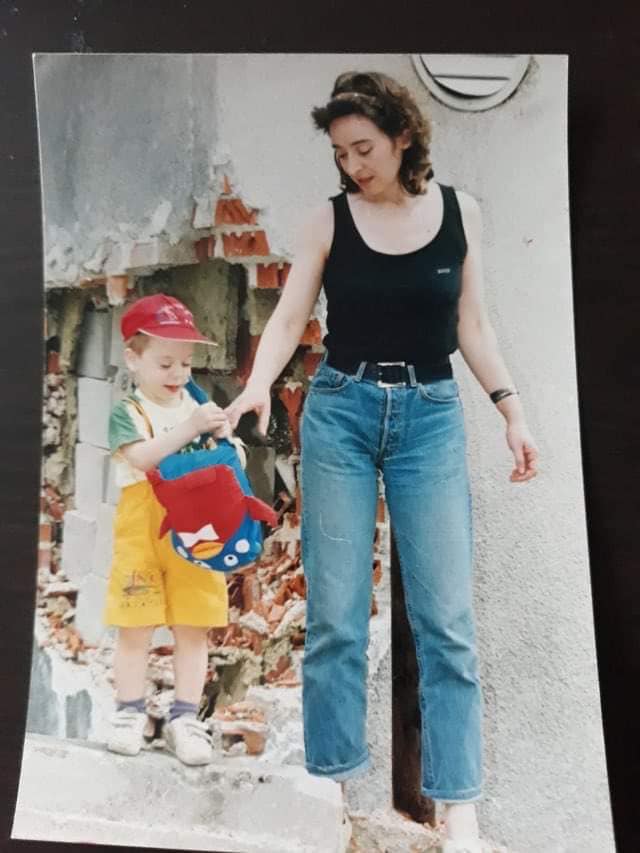
As did the photo that accompanied the story: me holding my “pigin” in front of a demolished wall. I’m little. I have no idea what’s happening.
The same again, just better quality footage
Nearly 30 years later, I am a journalist covering mainly world news, mostly following the war in Ukraine and now the war in Gaza. From my office, though.
Every day, I see wounded and dead children. There are no convoys evacuating children from Gaza. For them, there is no aunt and no Germany. I wonder every day what kind of a world this is, how it can watch this. A question my mother asked when reporting on the war in Bosnia. Everything is the same, just in higher resolution.
“The people of Gaza don't deserve certainly what's happened to them. The people of Ukraine don't deserve what's happened to them. But, of course, there are people, you know, who see it as not so black and white”, Daniszewski explained.
He noted that even in the U.S., there are people who think Russia had some reason for invading Ukraine, such as NATO expansion. He also explained that many Americans have a lot of sympathy for Israel because of what happened during the Holocaust.
However, he emphasized that there are people who protest against what is happening in Gaza. He recalled that this was also the case with the Vietnam War.
“But when I think about the war in Bosnia, I don't remember many people saying, ‘Oh, well, the Serbs have some justice on their side’. I don't think anyone felt that because it was just so one-sided and unfair,” he said.
“And then we had families like yours, which were mixed. And, you know, clearly, before the war started Bosnians had lived with each other and found common cause, but it's always the demagogues and the authoritarians who want to sow hatred and divisions among people,” he added.
His and My Sarajevo – Two Different Cities
As I listen to him, I think about what this man has seen. He is someone who has witnessed everything. He was wounded during the Romanian Revolution in 1989. Now he is engaged in improving journalists’ safety.
He has nothing left to prove. His vast experience is perhaps best seen in his demeanour, in the way he speaks – calmly and steadily. His answers to my questions come immediately, but they still seem thoughtful. It’s clear he has pondered over everything I asked him for a long time.
I have nothing to offer him as a journalist. He has so much to offer me.
It was clear he was happy to see me. To see Sarajevo again, in a completely different state from what it was in his memory. I don’t know that Sarajevo.
“It was, you know, in the first part of the war when I was here, it was pretty much a ghost city as far as traffic. And people were searching for food, searching for water and shelter. You didn't have the feeling that this was a living city, at least I didn't. And war is ugly. Literally, you know, when things are bombed and torn down, it's unattractive,” he said.
“But now we see a green city with beautiful red-tiled houses and parks. In those days, it was scarred buildings, scarred people, so it's so much different,” he said.
What’s the Point of all this?
I asked him the most important question: has the world learned anything from the war in Bosnia, or did I lose my childhood for nothing?
He began his answer with “unfortunately.”
“History does tend to repeat”, he said, adding that new generations are coming and they do not remember the lessons of the past.
“What we do know is that eventually peace came here, kind of a shaky peace at times, but it came and life could resume. And yes, what you sacrificed may not have solved all the world's problems, but at least here, it made things better….. Well, it would be nice if your suffering had changed the world, totally and finally, but it's just not human nature”, he said.
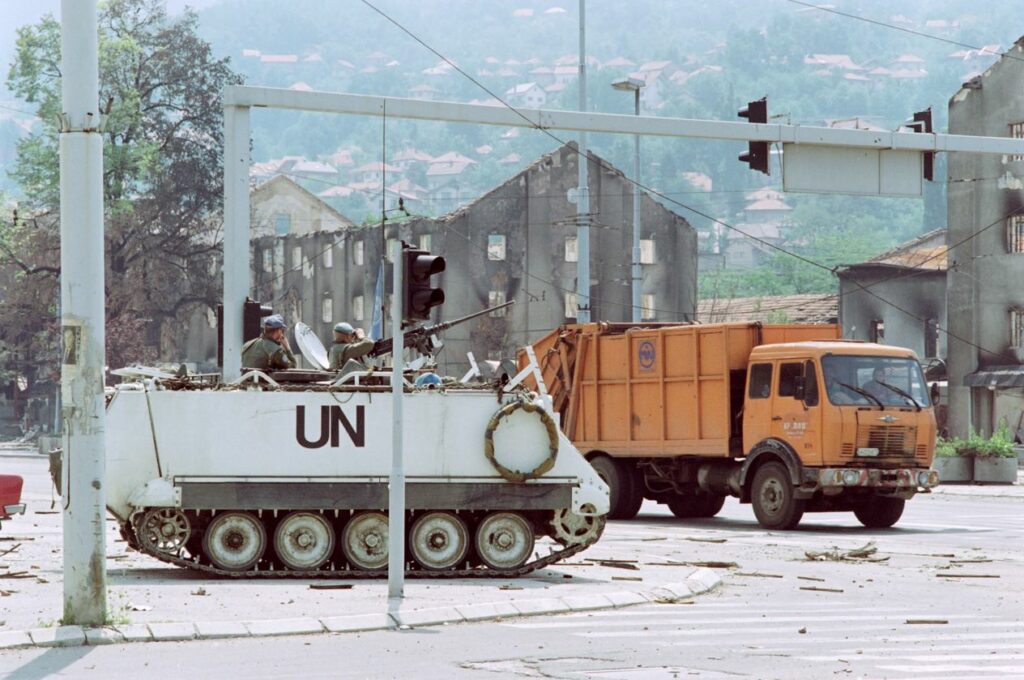
“You know, just in my career as a journalist there's been at least 10 or 20 wars and I don't think the world has ever been totally at peace. Although there are some people who say now that the world is more at peace historically than if you look back,” he added.
Still, Daniszewski is disappointed that the world learns slowly and with difficulty.
“Unfortunately, what happened here will serve as a lesson to some, but it should be a lesson to all, but people forget, new generations come,” he said.
At the conference, during one panel, a journalist from Gaza literally shouted at us in the audience. Why don’t we do something? How can we watch this? My mother was calmly watching her from the front row. She was asking those same questions a long time ago.
Daniszewski says he understands the anger of that journalist and her feeling that the world has turned its back on her people.
“But you know, from my age, 70, I just know that it's like she's coming on the whole thing new. And, you know, so many of us have been to Gaza during previous wars,” he said.
He said this is “the worst one by far”, but journalists have seen how Israel wages war in Lebanon before.
“She has great passion and the topic deserves passion, but I feel like to some extent this new generation is discovering the whole story fresh. And unfortunately, I do not really expect the conflict between Israel and Palestinians or Israel and the Arab world to end during my lifetime,” he said somewhat sadly.
However, he noted that in the U.S. “we do see public opinion shifting, not in favour of Hamas, but in favour of the Gazan people and a feeling that what Israel is doing is immoral, the attacks on human beings.”
He looked at me again.
“You know, I'm grateful that you grew up to have a good life and that Aida had the career that she's had,” he said.
When we parted, both of us went to join our own acquaintances at that reception at the Holiday Inn. My mother was standing with someone, and I approached.
“And?”
“He’s great. I think he cried.”
“Why?”
“I don’t know. I guess because I’m okay.”
*The views expressed in the columns and comments are the personal views of the authors and do not necessarily reflect the views of the N1 editorial staff.

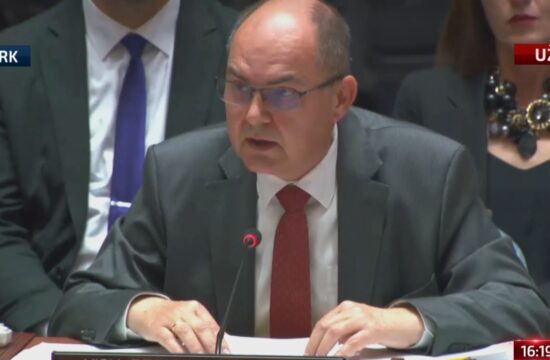



Kakvo je tvoje mišljenje o ovome?
Budi prvi koji će ostaviti komentar!